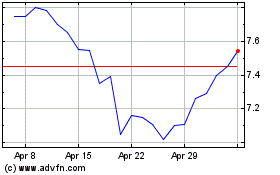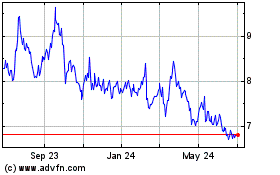FOCUS: Renault Affair May Spur Crackdown On Industrial Espionage
January 09 2011 - 2:31PM
Dow Jones News
The media buzz surrounding the apparent attempt by three Renault
SA (RNO.FR) executives to pass on confidential data on the car
maker's electric vehicle program is spurring the French government
to tighten legislation that could result in leaks of sensitive
corporate information being treated as a crime akin to selling
defense secrets.
Compared with other industrial powers like the U.S., France has
lagged in protecting its companies from the unwelcome attention of
foreign competitors and nations that don't refrain from espionage
to gain economic and competitive advantage.
But that is likely to change following the revelation on Jan. 3
that France's second-largest car maker has suspended the work
contracts of the three officials who had access to proprietary data
on electric vehicle projects, following a months-long
investigation. The managers face further questioning next week that
could lead to their dimissals.
Industry Minister Eric Besson said the term "economic warfare"
is appropriate in the Renault case, as foreign interests were at
the root of the security breach. But he stopped short of
identifying who was responsible.
However, extensive coverage in the French media has pointed the
finger at China, which is making a massive effort to develop a
world-standard electric vehicle industry. France's domestic
intelligence service hasn't been formally asked to investigate the
Renault case, but this is likely once the company files a civil
suit.
The Renault episode "illustrates once again the risks to our
companies from economic intelligence," Besson said last week,
adding that he has instructed his ministry and other administration
bodies to step up the requirement that intellectual property be
better protected at French companies that receive money from the
state.
France only started taking the threat of industrial espionage
seriously seven years ago after a parliamentarian, Bernard Carayon,
issued a report underlining how vulnerable the country's private
sector is to intrusion.
"In the U.S., as in China and Russia, the doctrine is both
offensive and defensive," Carayon said in an interview published
last week. "But here, it is insufficiently defensive and not at all
offensive."
Besson said in a radio interview last week that the government
is preparing draft legislation to protect industrial secrets in the
same way that breaches of defense secrets are punished by criminal
penalties. The idea is to make it a criminal offense "to obtain,
keep, reproduce or transfer to unauthorized third parties secret
information of an economic nature."
Following Carayon's 2003 report, successive French governments
have tried to educate companies, especially smaller and midsized
ones, on the dangers of leaks of sensitive corporate information,
but officials say there is still no real corporate culture that
includes a need to preserve secrets.
The head of France's intergovernmental agency dealing with
economic intelligence is quoted as saying in an interview published
in Sunday's edition of the Journal du Dimanche that the situation
is "alarming," with several thousands of cases recorded over the
last five years. They involve all sectors, all regions and
companies of all sizes, Olivier Buquen said.
Whereas in the past it was the big industrialized nations that
resorted to industrial espionage, the number of countries where
such practices originate is on the increase as companies in less
mature nations race to reduce their technology gap. The U.S.
recognized the danger 15 years ago when Congress passed its
Economic Espionage Act, which imposes criminal penalties much more
severe than those for intellectual property theft.
For Renault and its alliance partner Nissan Motor Co (7201.TO),
the stakes are huge. The companies are investing EUR4 billion to
ensure a place as market leader when electric vehicles become a
mass market, and allowing competitors to get hold of technical
secrets would be a considerable loss of their technical advantage.
China is on a massive push to develop its own electric vehicle
industry, and wants to invest EUR11.5 billion in the coming
years.
Renault's chief operating officer, Patrick Pelata, said in an
interview published in Le Monde on Saturday that his company had
been the object of an "organized international" network tasked with
extracting information from the Renault employees. "This was the
work of professionals," he said. However, Pelata said the
information that was leaked apparently doesn't include highly
sensitive technical information on electric vehicle batteries, such
as the way the batteries are assembled and the chemistry of their
electrodes. Instead, the information apparently involved less
sensitive data on vehicle architecture, costs and Renault's
economic model.
Some observers say the outrage of French politicians over the
security breach at Renault is somewhat ironic, as France has its
own sulfurous reputation as a prime actor in economic intelligence
gathering, sometimes through underhanded methods. An embarrassing
case came to light in the 1980s when it was revealed that seats in
the first-class compartments of some Air France planes had been
bugged.
An American diplomatic cable made public by WikiLeaks last week
quoted a German satellite company executive who referred to France
as the "evil empire" for technology theft, and claimed that France
inflicts more damage on the German economy through spying than
China and Russia together.
-By David Pearson, Dow Jones Newswires; +331 4017 1740,
david.pearson@dowjones.com
Nissan Motor (PK) (USOTC:NSANY)
Historical Stock Chart
From Jun 2024 to Jul 2024

Nissan Motor (PK) (USOTC:NSANY)
Historical Stock Chart
From Jul 2023 to Jul 2024
